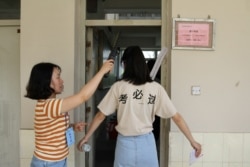Chunxiu Chen, the daughter of poor farmers, had set her heart on a college education that could lift her into the higher ranks of Chinese society. She studied hard and thought she had performed well on the all-important entrance examination but failed to earn a slot in a college or even the ability to see her results.
This year — after 16 years in low-paying jobs as a factory worker, waitress and kindergarten teacher — she finally got to see those results online, and what she saw came as a shock.
She learned that another student with a much lower score but well-connected parents had stolen her identity and assumed her place at a college in Shandong province. The impostor went on to acquire a job in local government and is still using Chen’s identity.
The case has attracted widespread attention in China, where the government-run Xinhua news agency last week called on authorities to thoroughly investigate the people responsible.
Since Chen’s story became public, others have come forward online to report similar experiences.
"These tragic cases that have been exposed are only the tip of the iceberg. Most of the cases are still uncovered,” said Hu Jia, a well-known rights activist in Beijing.
“In fact, with the media exposure in the modern era of the internet and the attention from the outside world, only very few cases were revealed. And the victims in those cases are the very lucky few."
According to a recent investigative report in China’s Southern Metropolis Daily, 14 colleges in Shandong province alone identified 242 people who were suspected of using other individuals' names to get into an institution of higher learning between 2018 and 2019.
Chinese political observers said such behavior reflects a broader reality in China, which is that vulnerable lower-class Chinese are often taken advantage of by those who are rich and powerful.
That pattern is especially evident in the college entrance examinations, which offer most lower-class Chinese their only opportunity to move up the social ladder. But the competition for a limited number of slots is fierce; it has been described by some people as “thousands of troops crossing a single-plank bridge.”
Hu Jia said such identity theft is most common in places where the competition is most intense, such as in the populous provinces of Shandong, Henan and Sichuan. He also said that the victims are mostly female.
He said powerful parents will also bribe or collude with college admissions officials to help children with low scores. This has the effect of pushing other students with better scores “down the bridge into the river."
Hu Jia said that when such fraud is discovered, the impostor’s family will often use money or social connections to “solve the problem.” Indeed, the family of the impostor who stole Chen’s identity offered to make a private deal, but Chen has hired a lawyer and is planning to take the case to court.
Hu Ping, a Chinese political commentator living in New York, said such abuses of the college entrance examination system are able to persist because the offenders face little threat of serious punishment.
"China's college entrance examination system should have very severe sanctions and punishment in place on identity theft, because it may be the only chance for tens of thousands of children from poor families to change their fate," he said.
“It also reflects the lack of effective oversight of China's education system itself, making it easy for impostors to appear. Moreover, outside the education system, there is a lack of a broad monitoring mechanism, namely, freedom of expression and freedom of the press."
This story originated in VOA's Mandarin Service with reporting from Adrianna Zhang.















